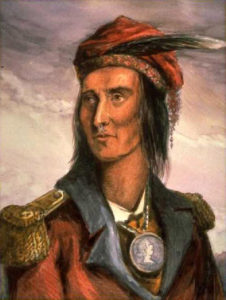Good morning, Whitewater.
Midweek in town will be partly cloudy, with a one-third chance of thunderstorms, and a high of seventy-four. Sunrise is 6:58 AM and sunset is 6:27 PM, for 11h 29m 20s of daytime. The moon is a waxing crescent with 16.9% of its visible disk illuminated.
On this day in 1813, Harrison defeats Tecumseh and the British:

A version of Lossing’s engraving (in wood) of Shawnee chief Tecumseh with water colors on platinum print. Via Wikipedia.
During the War of 1812, a combined British and Indian force is defeated by General William Harrison’s American army at the Battle of the Thames near Ontario, Canada. The leader of the Indian forces was Tecumseh, the Shawnee chief who organized intertribal resistance to the encroachment of white settlers on Indian lands. He was killed in the fighting.
Tecumseh was born in an Indian village in present-day Ohio and early on witnessed the devastation wrought on tribal lands by white settlers. He fought against U.S. forces in the American Revolution and later raided white settlements, often in conjunction with other tribes. He became a great orator and a leader of intertribal councils. He traveled widely, attempting to organize a united Indian front against the United States. When the War of 1812 erupted, he joined the British, and with a large Indian force he marched on U.S.-held Fort Detroit with British General Isaac Brock. In August 1812, the fort surrendered without a fight when it saw the British and Indian show of force.
Tecumseh then traveled south to rally other tribes to his cause and in 1813 joined British General Henry Procter in his invasion of Ohio. The British-Indian force besieged Fort Meigs, and Tecumseh intercepted and destroyed a Kentucky brigade sent to relieve the fort. After the U.S. victory at the Battle of Lake Erie in September 1813, Procter and Tecumseh were forced to retreat to Canada. Pursued by an American force led by the future president William Harrison, the British-Indian force was defeated at the Battle of the Thames River on October 5.
The battle gave control of the western theater to the United States in the War of 1812. Tecumseh’s death marked the end of Indian resistance east of the Mississippi River, and soon after most of the depleted tribes were forced west.
On this day in 1846, Wisconsin’s first constitutional convention meets:
On this date Wisconsin’s first state Constitutional Convention met in Madison. The Convention sat until December 16,1846. The Convention was attended by 103 Democrats and 18 Whigs. The proposed constitution failed when voters refused to accept several controversial issues: an anti-banking article, a homestead exemption (which gave $1000 exemption to any debtor), providing women with property rights, and black suffrage. The following convention, the Second Constitutional Convention of Wisconsin in 1847-48, produced and passed a constitution that Wisconsin still very much follows today. [Source: The Convention of 1846 edited Milo M. Quaife]
JigZone‘s Wednesday puzzle is of jasmine:
